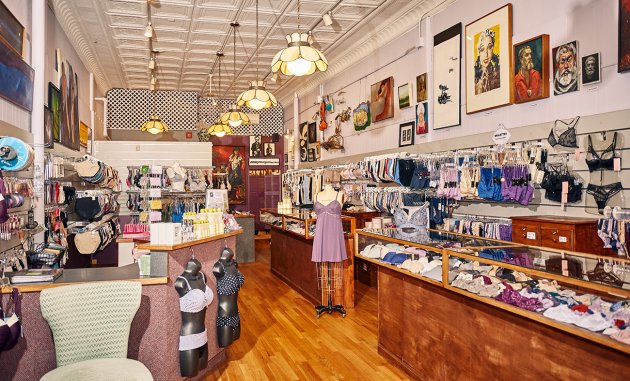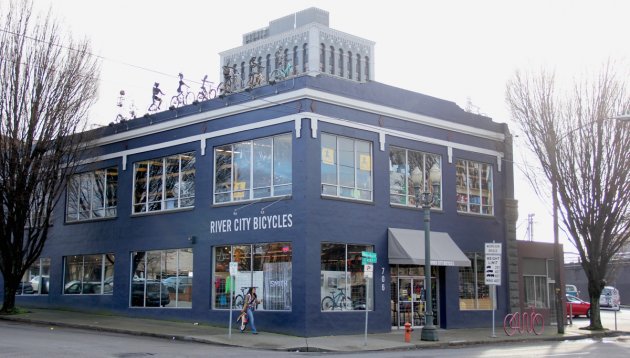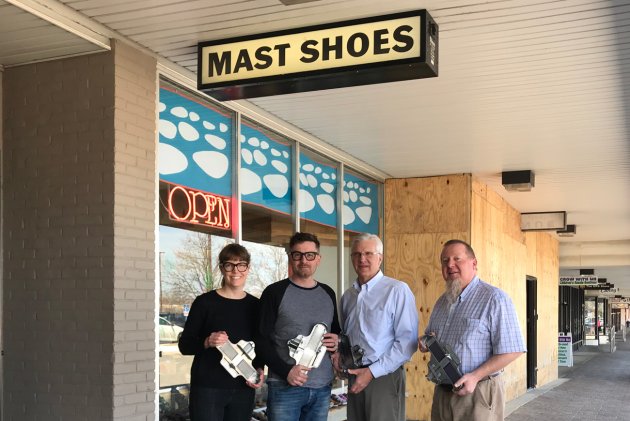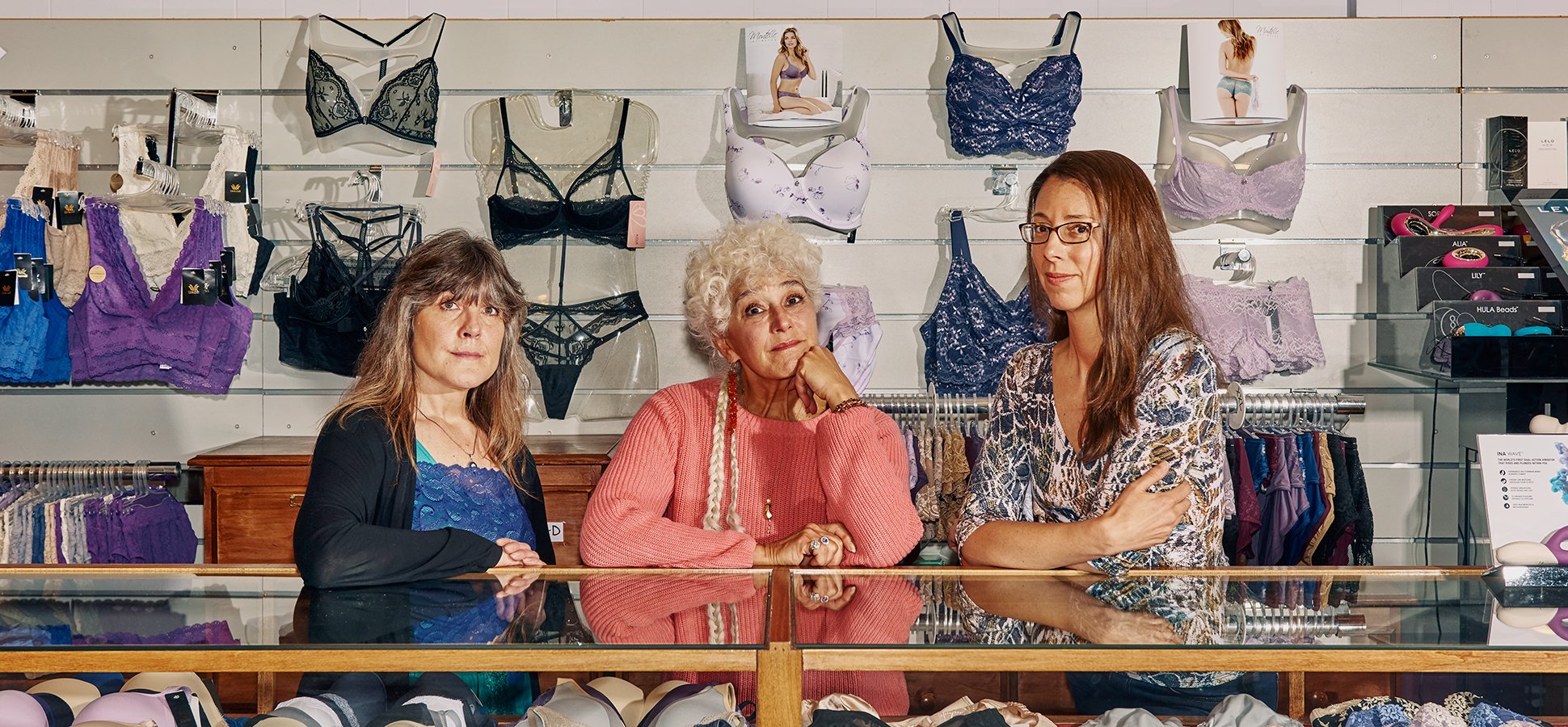Small companies thrash the giants on service. Businesses with 10 employees often care for their customers better than those with thousands, greeting people at the door and sticking with them to answer questions and fetch different sizes or options. Staff members are encouraged to solve individual problems creatively. And they are considerate of customers’ time: patient while attending to them and quick to make repairs or alterations so they can walk out with their purchases.
These companies are masters of customer service.
Gazebo Intimates
“Most people don’t know you can alter a bra,” says Judith Fine.
She’s right. Women view bras as enigmatically sized, more-or-less uncomfortable garments either hanging askew on racks in department stores or eroticized on mannequins in glam establishments like Victoria’s Secret. But at Gazebo Intimates, just off Main Street in Northampton, Massachusetts, bras are tools that serve the woman. “All we want is to make you feel comfortable,” says Fine, who sold the business in 2016 but retains a financial stake.
That means if a bra doesn’t fit perfectly, a seamstress is on hand to alter it. “It’s just a piece of fabric,” says Fine. “You can take the straps up. You can take the eyes and hooks in. You can take the cups in. You can make darts in the sides.”
Fine–a “flaming hippie”-turned-actress-turned-nude model-turned clothes designer–launched Gazebo in 1978. The original business comprised only her creations: chemises, camisoles, and nightgowns in vintage lace and pure silk or cotton. Unable to keep up with demand, Fine began ordering lines from other manufacturers. Soon, bras dominated the stock.
Gazebo became known for its extensive inventory (band sizes range from 30 to 54; cups from AA to M) and for its staff’s determination to achieve perfect fit every time. There’s no self-service at Gazebo; women are attended from the moment they walk in. An employee first asks a customer if she knows her size. “She will say she’s a 34B,” Fine says. “Well, we know she is not a 34B. So we’ll say, ‘OK, we can start there. But I am also going to hand you a 36F.'”
Fine taught herself to fit bras by sight and trained other employees, including Donna McNeight and Amy Dickinson, the store’s current owners. About 10 percent of bras require alterations. Staff may swap out an underwire for one with a better shape or take in a strap if the woman has sloped shoulders. The work is free for up to a year. If a bra becomes loose over time, for example, they will remove the hooks and eyes, cut away some fabric, and then replace them.
About 12 to 15 customers per week come in for post-mastectomy fittings, which may take as long as an hour in private rooms outfitted with couches, chairs, and art on the walls. “By the time women come to us, they have probably had chemo,” Fine says. “They have had radiation. They have been poked and prodded and touched and pulled and taped and cut. We are there to make them feel whole. We are there to give them dignity.”

Gazebo also serves a growing number of transgender clients. Fine, McNeight, and Dickinson take pride in providing a safe and comfortable environment for them. The three women agree their favorite customers, though, are girls coming in for their first fittings. “We try not to be old ladies about it,” Fine says. “The last thing she wants is for some lady to go, ‘Here I come! Let’s see what you look like, dearie!'”
River City Bikes
When 500 people routinely churn through your store on Saturdays, service starts with having enough people on the floor. At River City Bicycles, in Portland, Maine, 20 employees–as well as founder Dave Guettler–are on hand to assist customers and perform on-the-spot repairs.
Practically every employee is an expert by virtue of his or her own avid riding habit. The staff has included national bike champions and professional frame builders. And because employees work four-day weeks, they evince the patience and good cheer of the unstressed. “I don’t want people to be burned out,” Guettler says.
Biking was just taking off in Portland in 1995 when Guettler took over a mattress-manufacturing plant by a freeway off-ramp. A recent transplant from the Bay Area, where he had co-owned a chain of “crappy” bike stores, Guettler dreamed of creating a business with top-notch service and selection in a gorgeous space. “I wanted it to look more like a living room than a traditional bike shop,” says Guettler, who built all the fixtures, displays, and counters himself.
Anticipating frequent rain, Guettler constructed a test track upstairs, complete with bumps, so customers can audition their bikes without leaving the store. The track also calms parents watching small children take their first rides. Recalling how welcomed he had felt at Bergdorf-Goodman when an employee once offered him a Pilsner (“I bought an $18 pair of socks”), Guettler installed a coffee bar near the entrance and tempts customers with free cappuccino.

In a private studio just steps from the main store, three certified bike fitters use advanced motion-capture software along with traditional tools to adjust bikes to owners’ bodies. Customers sign up for the service after they’ve used their bikes for a while so they can describe any problems. “Many times they are very, very small adjustments that make all the difference in the world,” Guettler says.
The excellent service and selection, he says, are in lieu of constant sales he ran at his old business. “We may not get the immediate bump we would with a sale,” he admits. “But by respecting the customer, the benefit is long-term.”
Sugarsnap Catering
If you want folks to mingle, get them talking about food.
That’s the strategy at Sugarsnap Catering, in Burlington, Vermont. When clients tell owner Abbey Duke they want people to meet each other, she’ll set up stations around the room to promote conversation. At one station a chef is carving heirloom tomatoes and concocting little salads with gourmet salt and fresh mozzarella. Another is building Korean barbecue lettuce wraps. A third is slicing whole roast vegetables and plating them with sauce.
There might be a table where several local chocolate or cheese producers discuss their wares and pass out samples. “It helps people engage with the experience and with each other,” Duke says.
Sugarsnap does more traditional gigs as well. About a third of the business is drop-off catering, typically sandwich platters for business lunches. (Ben & Jerry’s is one longtime corporate client; Sugarsnap inhabits the same building as the ice cream giant’s headquarters.) For those jobs, “the important thing is that you be reliable, you take care of them, and you don’t waste their time,” says Duke.
That holds for the full-service side, too. But when she’s catering wedding, parties, and conferences, Duke has more room to both problem-solve and get creative. She asks clients how they want guests to feel and behave, which determines whether she deploys waiters passing trays or a barbecue station. Often she will give advice on venues.
Sugarsnap also can provide things that are difficult to find because Duke grows them herself. She launched the business in 2003, simultaneous with starting a farm. There she grows fresh flowers, asparagus fronds, and broom corn for decorations. Sugarsnap’s meals are flavored with unusual homegrown fresh herbs, such as summer savory and lemon thyme. And Duke delights in producing odd edible garnishes, including rat tail radishes and cucamelons, which she says look like adorable little watermelons.
“People told me I was crazy to start two high-labor, low-margin businesses at the same time,” Duke says. “I guess I was naive. But I think you have to be a bit naive to do it.”
Mast Shoes
When customers have stuck with you since Truman was president, you’re doing something right.
A woman in her 80s recently told Molly Mast-Koss that she’d been shopping at the family’s Ann Arbor, Michigan shoe store since she was a teenager. Others recall being served by her grandfather, Walter Mast, who opened Mast Shoes with his wife, Helen, in 1942. Mast-Koss, who runs the business today, still uses her grandparents’ Brannock devices to measure customers’ feet. “People say, ‘I can’t remember the last time I had my feet measured,'” Mast-Koss says. “We hear that multiple times a day.”
Mast-Koss and her staff of 15 do more than measure the length and width of feet. They also eyeball the height, the arch, the ankle, and how the foot moves. They ask questions about pain or difficulty walking. Some customers come with referrals from doctors who know Mast will have just the shoe for sufferers of plantar fasciitis or Achilles tendinitis. If a customer who comes in the morning says her feet swell by evening, staff may ask her to return later for a better fit.
But Mast is not an orthopedic shoe store. Rather it is a store selling fashionable shoes that are also healthy for feet. That requires substantial time and care examining every style from Mast-Koss’s preferred brands for structural integrity, arch support, alignment, and fit characteristics. (The store carries more than 10,000 pairs.) “We do have dress shoes,” Mass-Kost says. “We don’t do stilettos.”

Employees don’t just hand over boxes and disappear. Rather they stay to watch customers walk around, checking for abnormalities like pronation. And don’t call those employees “clerks.” They are “professional shoe fitters” trained by Mast in the technical specifics of each shoe, as well as foot and ankle biomechanics. “After three months of training, our people are fully competent,” says Mast-Koss. “But to be fully proficient, knowing more than you need to know, takes a year.”
The store also brings in medical professionals–specialists in diabetes, chiropractors, and physical therapists among them–to provide employees continuing education. “There is a doctor coming in a couple of weeks who is training his patients to walk with shorter steps,” Mast-Koss says. “He’s found it has been beneficial to the health of their joints.”
Mast Shoes, which served 32,000 customers last year, is relocating to a larger space to accommodate demand. “My plan,” Mast-Koss says,” is to steward us through our 100th birthday.”












